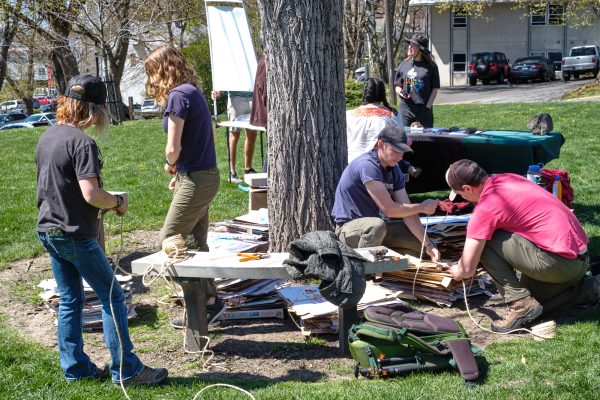Q&A with a sexual health specialist: Taylor Schwab
October 28, 2016
According to the American Sexual Health Association, 110 million Americans had active STIs in 2008, more than one-third of the U.S. population.
About one-fifth of those infections were found in young men and women ages 15 to 24.
Often college is romanticized as a wonderland of sexual activity, but rarely are the consequences of such activities shown or talked about.
In order to get the perspective of a public health professional, The Daily Evergreen asked WSU Health and Wellness Health Promotion Specialist and Health Education Coordinator Taylor Schwab a few questions via email on sexual health here on campus and on a broader scale.
Schwab is a certified health education specialist and has a master’s in public health.
Q) What is a common misconception college students have about sexual health?
A) “There are a lot of misconceptions when it comes to college students and their knowledge of sexual health. First off, students often think that everyone is having copious amounts of sex, all the time. This is not the case, but when someone thinks that way, it can put pressure on them to do the same. Another major misconception is how certain contraceptives work and how to use them properly.”
Q) What are some easy ways to ensure sexual health that you would like to see done more frequently?
A) “Students have a plethora of ways to ensure they are taking care of their sexual health. One of the most common and easiest ways to do so is making sure they are using some form of contraception. Contraceptives help prevent against pregnancies and STIs. Certain forms of contraceptives are beneficial for only preventing pregnancies (i.e. the various birth control methods). Condoms do a great job at preventing both pregnancies and STIs.”
Q) Does mental and emotional health affect sexual health and visa versa?
A) “Sexual health is definitely affected by a student’s mental and emotional well-being. Students are more likely to partake in unprotected sexual behaviors if they are emotionally or mentally unstable. Also, if a student goes through a negative experience with their sexual health, it can affect their mental and emotional well-being.”
Q) Is “hook-up culture” a problem in young adults? Is it safe to have sex that isn’t based in romance?
A) “‘Hook-up culture’ can lead to problems with young adults, but it is not inherently a bad thing. One major component of having good sexual health is being sexually empowered and to feel like you are in control of your own sex life. Hook-up culture starts to become a problem when students are participating in unsafe sexual practices, like not taking protective measures. Sex does not have to be directly related to romance to be safe. Safe sex refers to protecting yourself, and the other person, from unwanted pregnancies, STIs and other ailments.”
Q) How does the misconception that all college students are constantly having sex effect sexual health on campus?
A) “This misperception can drive students to do things that they may not necessarily be ready for. If I believe that everyone on campus is having sex constantly, I will be much more likely to have sex to feel like I am fitting in or being normal. One of Health & Wellness Services’ goals is to ensure we are providing students with accurate information and statistics. The pressure to fit in decreases when students get a more realistic picture of these statistics.”
Q) How would you describe the general attitude toward sexual health on campus? Do you think the student body is aware enough of the possible consequences of neglecting sexual health?
A) “I do believe the students are aware of the consequences of neglecting sexual health, but that does not mean they always listen to that knowledge. This becomes especially true when alcohol is involved. Alcohol can lower a person’s inhibition, which can cause them to do things that they would not normally do if they were sober, like having unprotected sex.”
Q) Do you think sexual health education pre-college is adequate? If not, what should be improved?
A) “Before students come to the university, the amount and type of sexual health education varies greatly. Each student comes to the university with different experiences, knowledge levels and education. Educating the students prior to college is vital for them to feel comfortable when it comes to sexual health when they get to the university.”
Q) Is there anything people can do to help ensure the sexual health of a close friend?
A) “Open communication is one of the most important things a friend can provide. Having a discussion about ways to take care of your sexual health can be beneficial. But it is important to remember that the conversation has to be two-sided. In the long run, you cannot force your friend to do anything they don’t want to do.”
Q) If you could deliver a message on sexual, emotional and mental health to the student body of WSU, what would it be?
A) “My message would be to make sure students are utilizing the free resources that are provided to them on this campus. Their tuition is paying for all of these amenities, so they should use them while they have access. This includes Health & Wellness Services, Counseling and Psychological Services, Recreation Center, and many other services on campus. In order to be as healthy as possible, students need to take care of themselves on all levels, including sexual, emotional and mental health.”


















